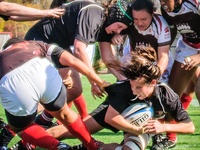The team’s transition to varsity reflects both increased popularity on campus and a desire to grow the sport nationally.
Haber believes that rugby has grown and broadened its appeal during her time on the team.
“We must have had 40 new girls show up to the first practice, which was really amazing,” she said. “You see all different types of people—people who are really in it because they want a varsity-level sport, people who just want to try something new, and people who are in it for the community, which I think was what the focus was on before. It was on the community and less on the competitiveness of the sport, and that’s what’s changing [now].”
But despite rugby’s increased commitment level, Svoboda still believes there is room for newcomers to join and be successful.
“Because it’s still an emerging sport, there’s room for new athletes to come into the school and sport and say, ‘Hey, I just want to try this out,’” Svoboda said. “I mean in all our sports, we have open tryouts and walk-ons, and I think it’s just an awesome setup. ”
Multimedia
Perhaps more important than the campus-wide changes that the varsity status brings are the nationwide changes that Radcliffe’s precedent will likely launch.
“For us, the biggest thing was what [becoming a varsity team] does to rugby throughout the country, how becoming a varsity sport legitimizes women’s rugby, and that was really important for us,” Hamlin said. “Once Harvard went varsity, it opened the gates for everyone else to go varsity.”
There seems to be increased interest in collegiate rugby, especially among Ancient Eight schools, although it remains to be seen whether other schools will follow the Crimson’s lead and seek varsity status.
“The Ivy League basically formed its own rugby conference, and I think that speaks to the interest in the sport, certainly on the Ivy League level,” Svoboda said. “Forming that kind of league for club sports is something that you just don’t see in other sports, and that’s a sign of increased interest from students in rugby.”
Further, rugby is growing on the world stage. It will return to the Olympics in 2016 for the first time since the 1924 Games, which makes the team’s successful transition even more exciting, according to Megan Verlage, who serves as captain of the backs.
“The sport is growing and is going to be in the 2016 Olympics,” she said. “Because of the development of the sport, we wanted to make sure we weren’t just keeping up but leading the way for making rugby a competitive sport at the collegiate level.”
Svoboda, for one, cites the physical nature of the sport as evidence of rugby’s high potential for growth and popularity—something that is unique within women’s athletics at Harvard.
“This will be the only full-contact women’s team that we have, which I think is pretty cool,” he said. “I can’t wait to go out and see games. Don’t tell me [the players are] not intense and don’t care about gaining that extra yard.”









